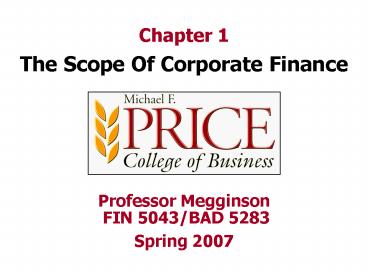The Scope Of Corporate Finance - PowerPoint PPT Presentation
1 / 27
Title: The Scope Of Corporate Finance
1
Chapter 1
The Scope Of Corporate Finance
Professor Megginson FIN 5043/BAD 5283
Spring 2007
2
What is Corporate Finance?
- The activities involved in managing cash flows in
a business environment
3
The Core Principles of Finance
- The time value of money
- The opportunity to earn a return on invested
funds means that a dollar today is worth more
than a dollar in the future. - Compensation for risk
- Investors expect compensation for bearing risk.
4
The Core Principles of Finance
- Dont put your eggs in one basket
- Investors can achieve a more favorable trade-off
between risk and return by diversifying their
portfolios. - Markets are smart
- Competition for information tends to make markets
efficient. - No arbitrage
- Arbitrage opportunities are extremely scarce.
5
The 5 Basic Corporate Finance Functions
6
The Financing Function
- Businesses can raise money in 2 ways
- externally from investors or creditors
- IPOs
- Primary market transactions
- Secondary market transactions
- internally by retaining operating cash flows
- Most common method
7
Raising Capital Key Facts
Most financing from internal rather than external
sources
Most external financing is debt
Primary vs. secondary market transactions or
offerings
Financial intermediaries declining as a source of
capital for large firms
Securities markets growing in importance
8
Global Security Issues 1990-2006 (Bn)
Global debt equity
U.S. Issuers worldwide
9
Number And Value Of Worldwide Security Issues In
2005
1 Totals do not include sovereign debt
offerings. Source Investment Dealers Digest,
early January 2006
10
World Stock Market Capitalization, 1983-July 2006
(US Billions)
Sources World Bank, World Federation
of Exchanges
11
Growth of World Stock Market Trading Volume,
1983-2006
Annualized, based on January-July 2006 data.
Source World Federation of Exchanges
12
The Capital Budgeting Function
13
The Capital Budgeting Function
- The capital budgeting process consists of three
steps. - Step 1 - identifying potential investments
- Step 2 - analyzing those investments to identify
which will create shareholder value - Step 3 - implementing and monitoring the
investments selected in step 2
14
The Financial Management Function
Managing daily cash inflows and outflows
Forecasting cash balances
Building a long-term financial plan
Choosing the right mix of debt and equity
15
The Corporate Governance Function
- Hires and promotes qualified, honest people, and
structures employees financial incentives to
motivate them to maximize firm value - In practice the incentives of stockholders,
managers, and other stakeholders often conflict. - Dimensions of corporate governance
- Board of directors
- Securities and Exchange Commission
- Sarbanes-Oxley Act of 2002
16
Global Mergers And Acquisitions, 1991-2006 (US
Billions)
Source Investment Dealers Digest, early January
editions, 1990-2007
17
The Risk Management Function
- Identifying, measuring, and managing all types of
risk exposures - Some risks are insurable, and some risks can be
reduced through diversification. - Financial instruments like forwards, futures,
options, and swaps may also be used to hedge
market risks such as interest-rate, price, and
currency fluctuations.
18
Forms Of Business Organization In The U.S.
19
Business Organizational Formsin the United States
- Shareholders are taxed as partners while still
retaining Limited Liability as Corporate
Shareholders - Status is Subject to Several Eligibility
Requirements
S Corporations
Limited- Liability Companies
- Combines the Partnerships Pass-Through Taxation
with the S Corporations Limited Liability
20
The Double Taxation of Dividends
Taxation of Business Income Corporations vs
Partnerships(Corporate Tax Rate (tc) 0.35
Personal Tax Rate (tp) 0.38)
21
The Tax Relief Act of 2003
Dividends are treated as capital gains, dividend
tax rate 0.15 Corporate Tax Rate (tc) 0.35
Personal Tax Rate (tp) 0.35
22
Forms of Business OrganizationsUsed by Non-U.S.
Companies
Limited-Liability Companies
- Britain public limited companies (PLC)
- Germany Aktiengesellschaft (AG)
- France Société Générale
- Spain, Mexico, and elsewhere in Latin America
Sociedad Anónima
State-Owned Enterprises
- Historically, the telephone, television, utility,
airline and railroad companies in many European
countries - Privatization programs have reduced the role of
the states around the world
How much has been raised through Privatization
Programs?
23
Worldwide Revenues From Privatizations, 1988-2005
(US Bn)
24
What Should a Financial Manager Try to Maximize?
- Maximize Profit?
- Earnings per share are backward-looking,
dependent on accounting principles, - Do not fully consider cash flow timing
- Ignores risk
- Maximize Shareholder Wealth?
- Maximize stock price, not profits
- Shareholders, as residual claimants, have better
incentives to maximize firm value.
25
Agency Costs
- Managers act as agents of the owners who hired
them and gave them decision-making authority to
manage the firm for the owners benefit. - In practice however, self-interests may cause
managers to pursue objectives other than
shareholder-wealth maximization. - This conflict of goals gives rise to managerial
agency problems.
26
How Agency Costs Can Be Controlled
Ways to deal with agency costs
- Takeovers
- Monitoring and bonding costs
- Compensation contracts
- Controversial method executive compensation
- Average pay in 2005 for CEOs of 500 largest US
firms 10.9 million (Source Forbes, April 20,
2006)
27
Importance of Ethics
- Widespread publicity surrounding numerous ethical
violations began with the Enron collapse in late
2001. - Society in general and the financial community in
particular are developing and enforcing ethical
standards. - Ethical behavior is necessary in order to
maximize shareholders wealth.































